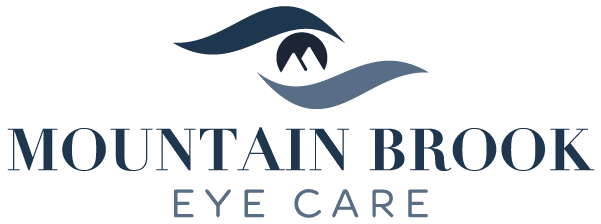Can Stress and Anxiety Affect Your Vision?

Blurry vision, eye strain, or sudden floaters—are these just random symptoms, or is your body trying to tell you something?
If you’ve noticed your vision acting up during stressful periods, you’re not alone. At Mountain Brook Eye Care, we see patients every day who are surprised to learn that stress and anxiety can directly impact their eyesight. The good news? You’re not imagining things—and you’re not stuck with these symptoms.
In this article, we’ll break down how stress affects your eyes, which symptoms to watch for, and what steps you can take to feel better—right here in Mountain Brook, AL.
This Article Will Address:
- How stress affects your eyes and vision
- Symptoms of stress-related vision problems
- When vision changes might signal something more serious
- Whether stress-related issues can become permanent
- How to manage and treat vision problems linked to anxiety
- When to seek professional help from an eye doctor
- Why Mountain Brook Eye Care is the right choice for you
How Does Stress Affect Your Eyesight in Birmingham?
When you’re under stress, your body activates its fight-or-flight response. This reaction, while helpful in emergencies, can create temporary disruptions in your visual system. Here’s how:
- Pupil Dilation & Muscle Tension: Makes your vision feel sharp but strained, leading to blurred or distorted sight.
- Increased Adrenaline: Can raise your intraocular pressure (IOP)—especially concerning for those at risk for glaucoma.
- Rapid Breathing (Hyperventilation): Alters blood flow to the eyes and brain, causing tunnel vision, floaters, or light sensitivity.
These effects can be unsettling, but they’re your body’s way of responding to stress. If they persist, though, it’s time to seek care.
What Are the Symptoms of Vision Problems Caused by Stress?
Stress-induced eye issues can look different for everyone, but some of the most common symptoms include:
- Blurry or double vision
- Light sensitivity
- Eye strain or twitching
- Seeing floaters or flashes
- Tunnel vision
- Dry, itchy, or watery eyes
- Headaches that involve visual changes
While many of these symptoms can come and go, frequent or worsening changes warrant a professional exam.
How Do I Know If My Vision Changes in Birmingham Are from Anxiety or Something Else?
It can be difficult to tell if vision changes are caused by stress or something more serious. Here are a few ways to help you differentiate:
- Stress-related vision symptoms tend to:
- Happen during or after a stressful event
- Improve with relaxation or rest
- Occur alongside muscle tension, headaches, or anxiety
- Be short-term or intermittent
- More serious eye conditions may:
- Develop gradually and persist regardless of stress
- Worsen over time if untreated
- Involve eye pain, vision loss, or structural changes
- Not improve with relaxation alone
At Mountain Brook Eye Care, our comprehensive eye exams are designed to rule out underlying medical conditions and provide answers. If stress is playing a role, we’ll work with you to address both the symptoms and their cause.
Can Stress-Related Vision Issues Be Permanent If Untreated?
In most cases, stress-related vision problems are temporary and reversible. However, prolonged or chronic stress can have lasting effects:
- May worsen glaucoma by keeping IOP consistently elevated
- Increases risk of chronic dry eye and associated discomfort
Early intervention is key. The sooner we evaluate your symptoms, the better chance we have of preventing long-term issues.
How Can You Manage Vision Symptoms Related to Stress?
If you’re experiencing vision problems caused by stress, the following approaches can help:
- Practice relaxation techniques like deep breathing, meditation, or yoga
- Prioritize rest and sleep to reduce eye fatigue
- Stay hydrated and limit screen time
- Consider vision therapy or prism lenses if stress impacts your visual processing
- Seek help from a mental health provider if anxiety is interfering with daily life
At Mountain Brook Eye Care, we can create a personalized plan that combines professional eye care with lifestyle strategies to help you manage your symptoms.
When Should You See a Doctor for Stress-Related Vision Problems in Mountain Brook?
While mild symptoms may pass on their own, the following signs mean it’s time to call us:
- Sudden vision loss
- Persistent floaters or flashing lights
- Severe or recurring headaches with visual symptoms
- Ongoing dry eyes or blurry vision that doesn’t improve with rest
Don’t wait and wonder. Getting answers early can help protect your long-term vision.
Why Choose Mountain Brook Eye Care for Vision Issues in Mountain Brook, AL?
When it comes to your eyes, you deserve personalized care from professionals who truly listen. At Mountain Brook Eye Care, we offer:
- Local expertise in diagnosing complex vision issues
- Comprehensive, personalized eye exams
- Compassionate care from a team that values your well-being
- Easy scheduling and a comfortable, welcoming environment
Whether you’re dealing with occasional symptoms or ongoing concerns, we’re here to help.
Take the First Step Toward Clearer, Healthier Vision!
Stress-related vision changes can feel overwhelming—but they don’t have to control your life. With the right care and guidance, you can protect your vision and your peace of mind.
If you’re in Mountain Brook, AL and noticing unusual changes in your eyesight, let Mountain Brook Eye Care be your next step toward clarity. Schedule your appointment today!
Sources
- American Academy of Ophthalmology (AAO)
- Healthline: How Stress Affects Vision
- Eye Clinic London
- Optometrists.org
Dr. Jeremy Edgerly
Dr. Edgerly has been actively practicing optometry since 2012 in a family practice setting. He is confident in his ability to accurately diagnose, treat and manage conditions of the eye and local structures. He attended the University of Alabama at Birmingham and earned a Bachelor of Science. Upon completing his undergraduate studies, he enrolled in the UAB School of Optometry, where he earned a Doctorate in Optometry. There, he received specialized training in ocular diseases, contact lenses, pediatrics, and refractive and cataract surgery co-management.

